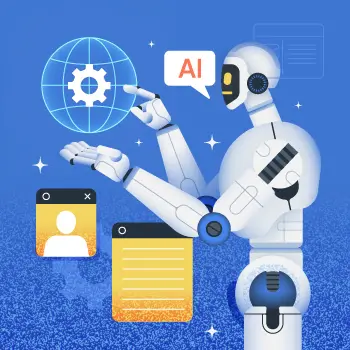- What is Agentic AI, and What is the Buzz Around it?
- Why Are Tech Leaders Focusing on Agentic AI?
- 6 Real-World Applications of Agentic AI
- Ethical AI Considerations that Require Attention
- Challenges in Implementing Agentic AI
- Best Practices for Implementing Agentic AI
- Summary
The evolution of the artificial intelligence (AI) domain is progressing at a rapid pace, and just when we are wrapping our heads around GenAI, another game-changing technology has come into the picture: agentic AI. It’s not just another buzzword; it has the capabilities to transform business processes by automating workflows and decision-making and even predicting customers’ needs. This technology brings the versatility and flexibility of LLMs and the accuracy of traditional programming together. Â
What is Agentic AI, and What is the Buzz Around it?
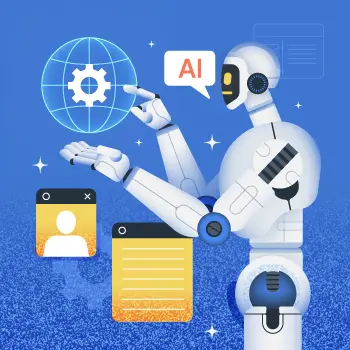
Agentic AI is one of the innovative advancements in the AI industry. It is the combination of different AI approaches, techniques, and models that create a new series of autonomous agents to analyze data, establish goals, and create action plans to achieve them. And the plus point is that businesses do not even require a lot of human input to manage it. Compared to traditional AI models that simply execute predefined prompts or tasks, agentic AI can make decisions and plan actions on its own and can even learn from its experiences to fulfill the goals set by its users. Â
Agentic AI employs advanced AI techniques, such as reinforcement learning, ML algorithms, and LLMs, to constantly learn and improve with every interaction. For example, LLMs leveraged by OpenAI’s ChatGPT, Meta Llama, and Google Gemini assist in making autonomous systems analyze, understand, and respond to NL (natural language) commands. These systems can also analyze data and identify patterns between different datasets. By doing so, they can learn from their actions and improve their decision-making capabilities. Â
Agentic AI is navigating a new era by supporting autonomous agents with independence in non-rules-based processes and decisions, which will transform industries and the way we interact with technology. But it’s not just about automation; it’s about upskilling machines so that they can become partners of humans in solving complex problems, support businesses with critical thinking and decision-making capabilities, and take action and learn from them. Â
Why Are Tech Leaders Focusing on Agentic AI?
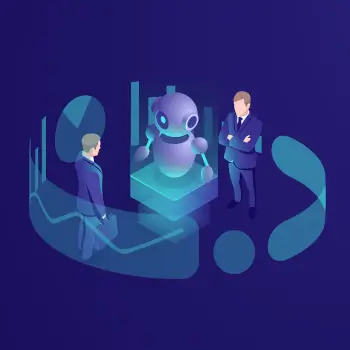
Following are some of the reasons why tech leaders are focusing on agentic AI solutions:Â
- In fast-paced and ever-evolving processes like supply chain management, cybersecurity, customer support, and finance/banking, agentic AI would allow businesses to adjust their strategies in real time and facilitate quick decision-making. This would allow businesses to remain adaptable and resilient to changing market conditions.Â
- Agentic AI solutions can solve complex problems by leveraging ML with goal-oriented behaviour to analyze data, identify data, and autonomously make decisions with optimal outcomes. It will also offer real-time problem-solving solutions in the dynamic business ecosystem.Â
- By leveraging agentic AI, businesses can streamline their decision-making processes and respond to changing market conditions in real time. The autonomous nature of agentic AI will allow this technology to quickly process large amounts of data, significantly speeding up workflows. This time efficiency helps businesses stay competitive by enabling them to act faster.Â
- Agentic AI systems can adapt to rapidly changing market conditions, making them highly scalable. As business demands grow or evolve, these systems will seamlessly adjust and continue functioning without requiring substantial new resource investments. This level of scalability will ensure businesses can expand operations without encountering the usual bottlenecks of scaling traditional processes.Â
- Some of the key characteristics of agentic AI are autonomy and handling tasks with approximately zero supervision. This level of independence would allow systems to handle complex workflows and challenges in real time, allowing human employees to initiate important business-development strategies and reduce operational bottlenecks. This is another benefit that tech leaders are looking for in terms of efficiency.Â
- Agentic AI can significantly lower operational costs by automating complex workflows and eliminating manual tasks. With reduced dependency on human supervision, businesses can save costs while improving accuracy and minimizing costly human errors. This cost-efficiency makes it an attractive solution for organizations aiming to optimize their resources.Â
- Agentic AI offers robust risk management capabilities by autonomously analyzing data and making decisions based on predefined goals. This technology has the ability to detect potential risks in real time, allowing businesses to mitigate them proactively. Understanding emerging threats or inefficiencies would allow tech leaders to make informed decisions that minimize risk and safeguard business operations.Â
6 Real-World Applications of Agentic AI
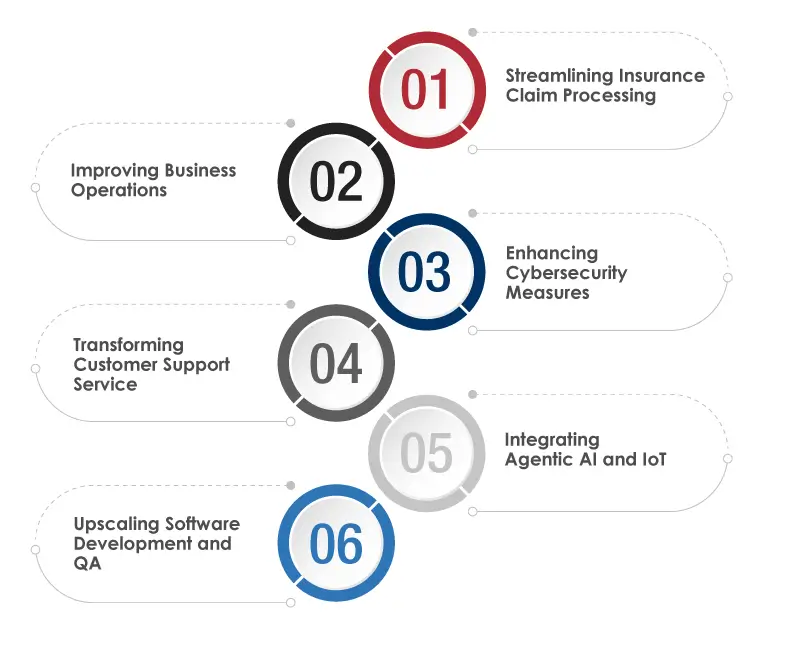
Streamlining Insurance Claim Processing:
The insurance industry has a lot of paperwork and manual processes, but agentic AI can change all that. Insurance businesses can utilize agentic AI solutions to automate claim processing completely. They can instantly assess the claim validity, gather relevant data from multiple sources, and communicate better with respective customers clearly and professionally. The result? Faster processing times reduced administrative burden, improved customer experience, and reduced errors. Â
Improving Business Operations:
Agentic AI would change how businesses handle their daily tasks/operations/processes. The AI agents can autonomously manage demand forecasting, handle complex logistics, optimize the supply chain, and check inventory levels. Businesses can easily process huge datasets and free themselves from real-time decisions, which would reduce costs and improve operational efficiency.Â
Enhancing Cybersecurity Measures:
As digital threats have become a big problem for businesses, agentic AI can guard network security tirelessly. AI agents can autonomously monitor network traffic, identify loopholes, detect anomalies, and run remediation measures to attack against cyber threats in real time without human supervision. It can help organizations enhance their security infrastructure and address complex security challenges. Â
Transforming Customer Support Service:
Every business across all industries wants to deliver an expectational customer experience. Agentic AI can enhance customer support service by assisting software agents in providing personalized and 24/7 service beyond simple FAQs and automated responses. AI-enabled customer support agents would be able to understand written and oral queries, predict customer requirements, and resolve complex issues on their own. This level of hyper-personalization can help build brand loyalty and upscale customer experience.Â
Integrating Agentic AI and IoT:
It’s been noticed that various use cases are possible with the integration of Agentic AI and the Internet of Things (IoT). For instance, a network of interconnected sensors and devices equipped with an agentic-AI-powered agent can monitor, analyze, and optimize operations in real time. This can completely transform and take industries like healthcare, transformation, and manufacturing to a whole new level of improved efficiency, safety, and reduced costs. Â
Upscaling Software Development and QA:
What would it be like to have AI agents that can autonomously generate code and manage the entire development lifecycle? On top of that, they can also design system architecture, write/debug code, and supervise the quality assurance (QA) process. The result would be a dramatic improvement in the software production cycle and will transform how businesses design, develop, and maintain digital products.Â
Ethical AI Considerations that Require Attention
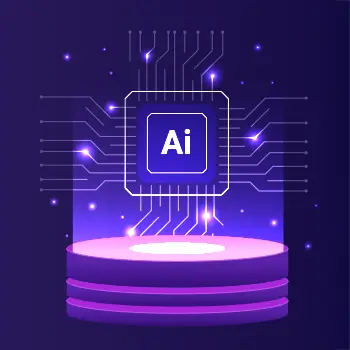
Although Agentic AI may have so many perks across industries, it also brings some of its challenges. Considering ethical dilemmas like ensuring the decision-making aligns with human values, the challenges are bound to occur. Because of the complex nature of AI models, businesses would face obstacles in understanding or interpreting their decision-making. Another ethical issue is ensuring accountability and trust in high-stake applications. Who will be held accountable if the agentic AI makes a blunder?Â
Another ethical issue is data privacy and security. These systems will turn business processes autonomous and independent, so enterprises will need robust security measures to ensure protection against breaches and human misuse. Businesses would also have to consider the potential impact of AI agents on a respective job. It’s true that Agentic AI can create potential opportunities and optimize productivity, but it would also suddenly shift workforce roles, education, and skills.Â
Challenges in Implementing Agentic AI
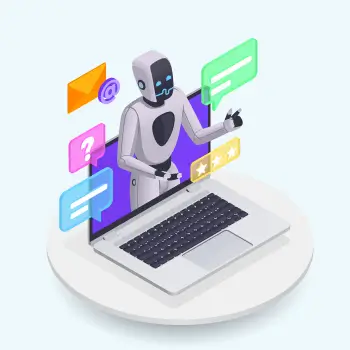
Implementing AI agents comes with several challenges. Integrating Agentic AI into existing systems brings technical complexities, especially for businesses using legacy applications. They will need careful planning and technical expertise to ensure AI agent’s compatibility with their existing workflows and infrastructure. On top of that, companies have to invest in workforce training to manage the shift in operational processes and interpret AI-driven insights. Â
Another challenge is the implementation cost. The initial investment in developing and integrating AI systems can be high (depending on business requirements). The cost includes training expenses, system upgrades, and maintenance. In addition, the top management must address the data privacy and security concerns regarding Agentic AI. Compliance with data protection standards and strong security protocols would be necessary to address risks. Â
Best Practices for Implementing Agentic AI
Businesses should have clear AI governance frameworks and compliance measures consisting of pre-defined roles and responsibilities of each stakeholder. These stakeholders will be responsible for the development, deployment, and QA of agentic AI systems. Establish clear guidelines, include relevant compliance and regulations, and create monitoring and auditing processes. Next is to ensure the implementation of robust security protocols like encryption, regulatory and compliance vulnerability assessments, and access controls, which would help protect sensitive data and maintain Agentic AI integrity. Â
Businesses should also conduct E2E testing and validation of agentic AI systems to ensure their safety and reliability. When conducting testing, consider both expected and unexpected scenarios to identify and mitigate flaws before deploying the final product in the real world. Businesses should also continuously update the agentic AI systems to ensure their security and effectiveness. Continuous monitoring and improvement will maximize the rigidity and value of agentic AI investment.Â
How does TestingXperts (Tx) integrate Agentic AI with the software testing and QE Services?

At Tx, we know the benefits Agentic AI can bring to the business environment. We further enhance automation and efficiency by integrating AI into our software testing and quality engineering practices. Here’s how we can help you:Â
Autonomous Test Execution: With AI’s decision-making capabilities, we at Tx entirely automate the QA process to adapt to the dynamic nature of software development. AI agents automatically generate test cases, identify gaps, and comprehensively cover test scenarios with minimal supervision. The result is faster QA cycles and reliable outcomes.Â
Predictive Analytics: AI can quickly analyze past data and detect patterns to improve predictive analytics capabilities in testing. We prioritize test cases by identifying defects, risks, and bottlenecks, focusing on product quality and performance parameters. Â
Process Optimization: AI streamlines testing workflows by autonomously optimizing test execution, resource management, and test environments in real time. This allows our clients to reduce operational overhead, accelerate time-to-market, and minimize human errors without degrading product quality.Â
Self-healing and Optimization: AI agents detect redundant tests or test cases that do not effectively cover risks during execution. Leveraging AI, we optimize the test suite by expelling irrelevant tests and focusing more on critical areas.Â
Summary
Agentic AI will transform the business industry by integrating the adaptability of LLMs with the precision of traditional programming. Unlike conventional AI, which follows predefined tasks, agentic AI autonomously makes decisions, plans actions, and learns from experiences to achieve user-defined goals with minimal human intervention. It has the potential to transform various business sectors by enabling real-time adjustments and efficient decision-making.Â
Ensuring the quality and reliability of agentic AI systems is crucial, and this is where TestingXperts’ AI services come into play. Our AI-based accelerators, Tx-SmarTest and Tx-HyperAutomate, are designed to enhance software testing and automation processes. We assist businesses validate and optimize their AI solution implementations, ensuring they operate effectively and securely. By leveraging our expertise in QA for AI systems, you can confidently navigate this complex technology and unlock its full potential. To know how we can help, contact our experts now.Â
FAQsÂ
Q1 What is Agentic AI?Â
Agentic AI is the combination of different AI approaches, techniques, and models that create a new series of autonomous agents to analyze data, establish goals, and create action plans to achieve them.Â
Q2 What is the difference between Agentic AI and Generative AI?Â
Agentic AI acts independently and can make decisions, perform tasks, and interact with its environment without human intervention. Generative AI creates new content, such as images, text, music, or code, in response to user prompts.Â
Q3 Will Agentic AI be the new trend in Generative AI?Â
Agentic AI is a type of AI that can make decisions and take actions independently to achieve goals. Compared to traditional AI models, Agentic AI can make employees more productive and automate multi-step processes.Â
Q4 How will the Agentic AI testing system shape the future of the testing process?Â
Agentic AI testing systems will upscale the QA process by automating complex tasks, improving accuracy, and enhancing efficiency. These systems can autonomously generate test cases, detect real-time issues, and adapt to dynamic software environments.Â
The post Why Agentic AI is the Next Big Thing in the Business Industry first appeared on TestingXperts.
Source: Read More


